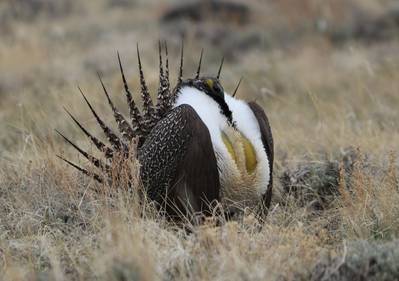The U.S. Interior Department on Monday launched an overhaul to an Obama-era plan to protect sage grouse that it says aims to both preserve the species of bird while expanding opportunities for oil development in western states where they live.
The move is a win for the drilling industry which had long argued that the plan developed by former President Barack Obama was too restrictive, but a setback for conservation groups concerned the Interior Department under President Donald Trump is watering down wildlife protections.
Interior Secretary Ryan Zinke in a memo on Monday directed his deputy David Bernhardt to make nine broad changes to the program. In June Zinke stated the sage grouse protection program needed to be revised to "protect sage grouse and its habitat while also ensuring conservation efforts do not impede local economic opportunities."
The recommendations are intended to give states more flexibility to deal with habitat management, waivers, and mineral leasing and development.
Environmental groups protested the move, saying it might lead to unraveling a complex and delicately balanced strategy that took federal agencies years to negotiate with state and local governments, scientists, ranchers and other private interests.
"The recommendations are a sideways attempt to abandon habitat protection for unfettered oil and gas development and in favor of discredited, narrow tools like captive breeding and population targets," said Nada Culver, senior policy director at the Wilderness Society.
Obama's 2015 plan to protect the ground-dwelling bird was widely seen as a compromise with business interests because it required certain protections, but fell short of placing sage grouse on the endangered species list - a move that would have imposed far more rigid restrictions on development.
But miners, oil drillers and ranchers in some western states had said Obama's plan to preserve the chicken-sized prairie fowl was too restrictive and prohibited economic development.
Sage grouse are considered by conservationists to be a key indicator species for America's dwindling sagebrush ecosystem. They are now believed to number between 200,000 and 500,000 birds across 11 Western states and southern Alberta.
(Reporting by Valerie Volcovici; Editing by Lisa Shumaker)






